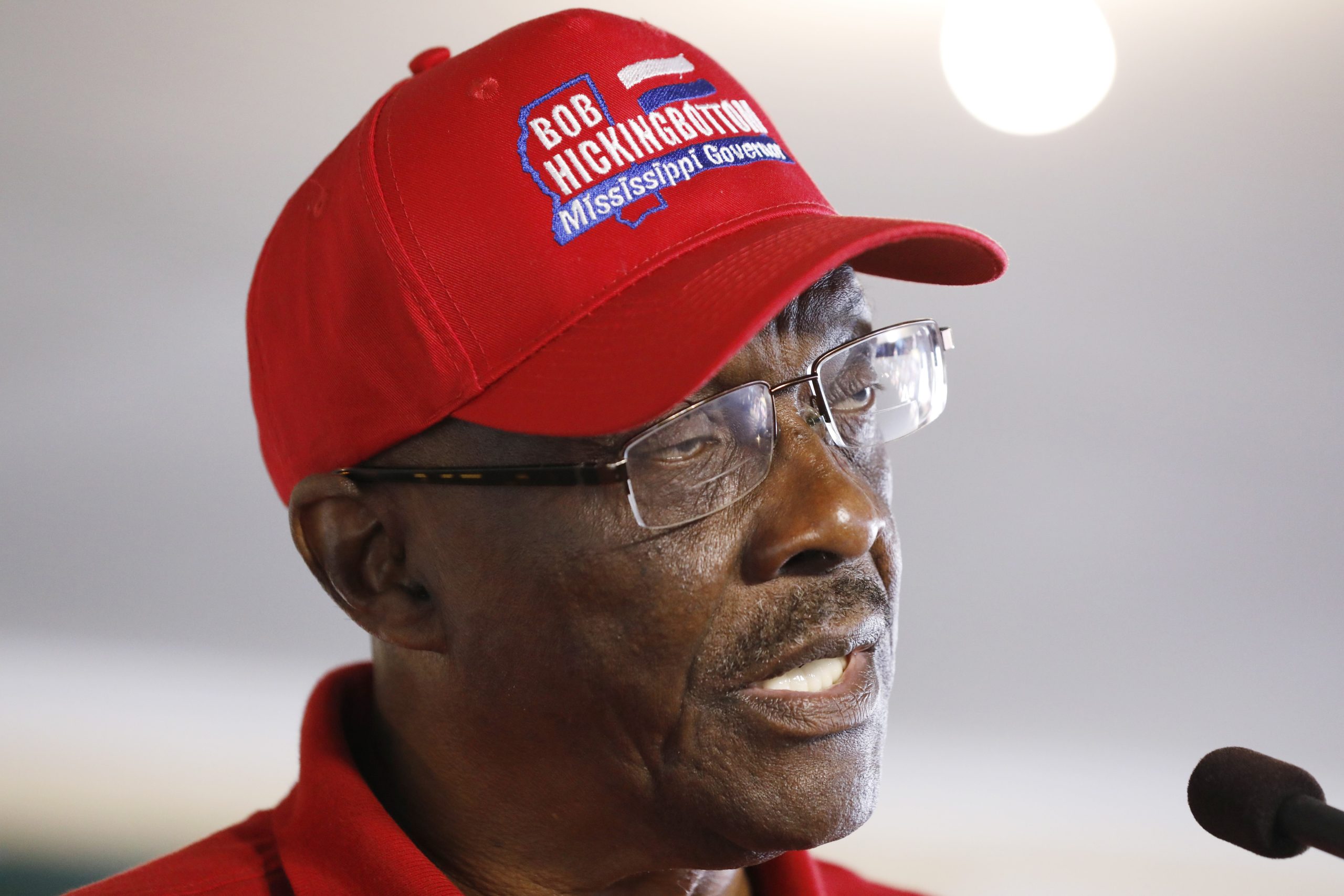Mississippi Today
What is Bob Hickingbottom up to?
What is Bob Hickingbottom up to?
Bob Hickingbottom, a little-known Democrat running for governor in 2023, posted a soon-to-be viral message to his campaign Facebook page on Feb. 17 around 3 p.m.
“… I hope you will join me and vote for the Democrats from the top to the bottom of the ticket. With the exception of my good friend Lt. Gov. Delbert Hosemann who has to run as a Republican to win. Delbert is really a Democrat and has been our friend through the years. We all need to do everything we can for him,” Hickingbottom wrote to his 400 or so page followers.
A few minutes later, at 3:34 p.m., Hosemann’s GOP opponent in the August primary for lieutenant governor, state Sen. Chris McDaniel, posted a screenshot of that Hickingbottom post onto his own page with the post: “There you have it. Democrats Love Delbert! #DelbertTheDemocrat.”
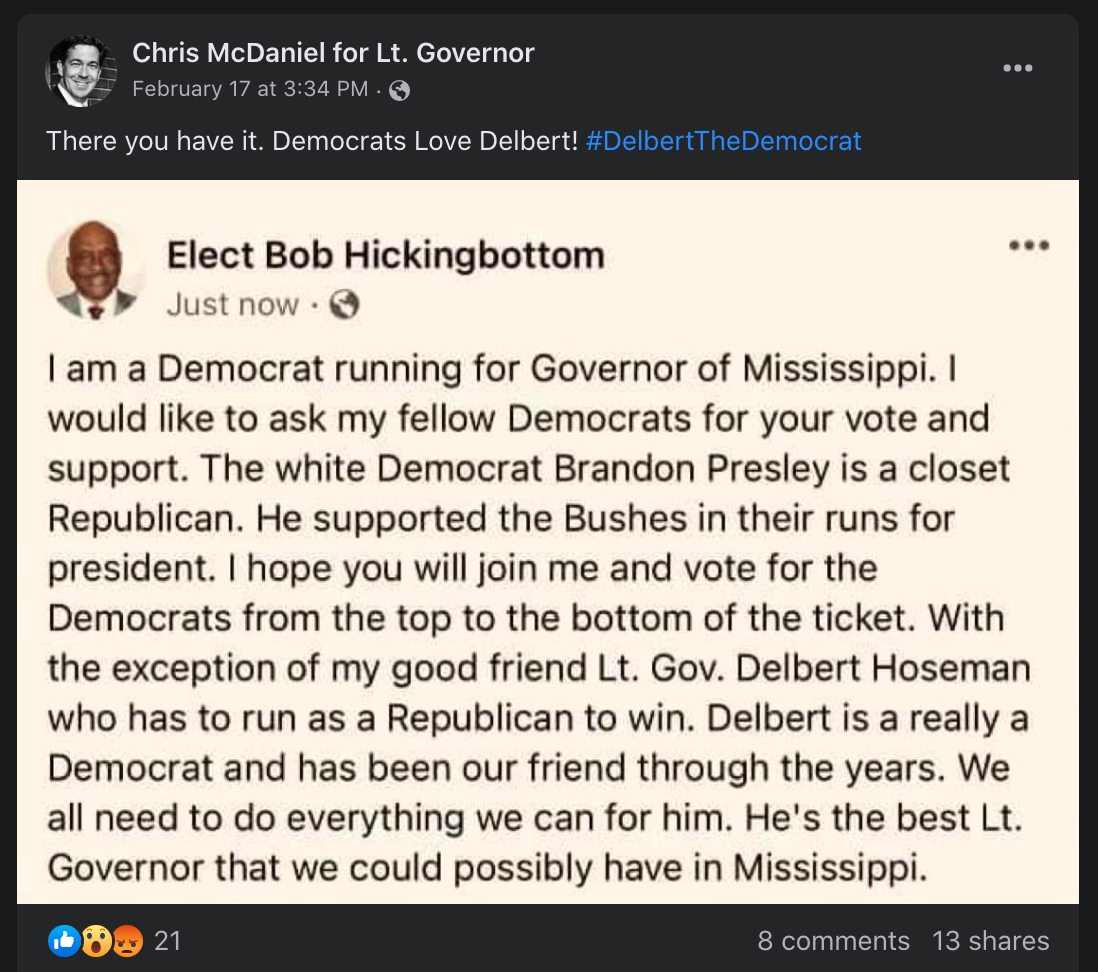
McDaniel is the far-right conservative who developed a national brand and following in 2014 when he nearly defeated longtime U.S. Sen. Thad Cochran. In that 2014 race, McDaniel ran what is considered the first Mississippi campaign to realize the full political power of social media. He has since sharpened that skillset and has hundreds of thousands of followers of like-minded, fired-up conservatives across the state and nation.
After McDaniel posted the Hickingbottom screenshot, his social media machine got to work. Several right-leaning and pro-McDaniel Facebook groups and users begin reposting it with the hashtag #DelbertTheDemocrat. Many of these other accounts have ridden McDaniel’s coattails in the development of their own brands and social media followings.
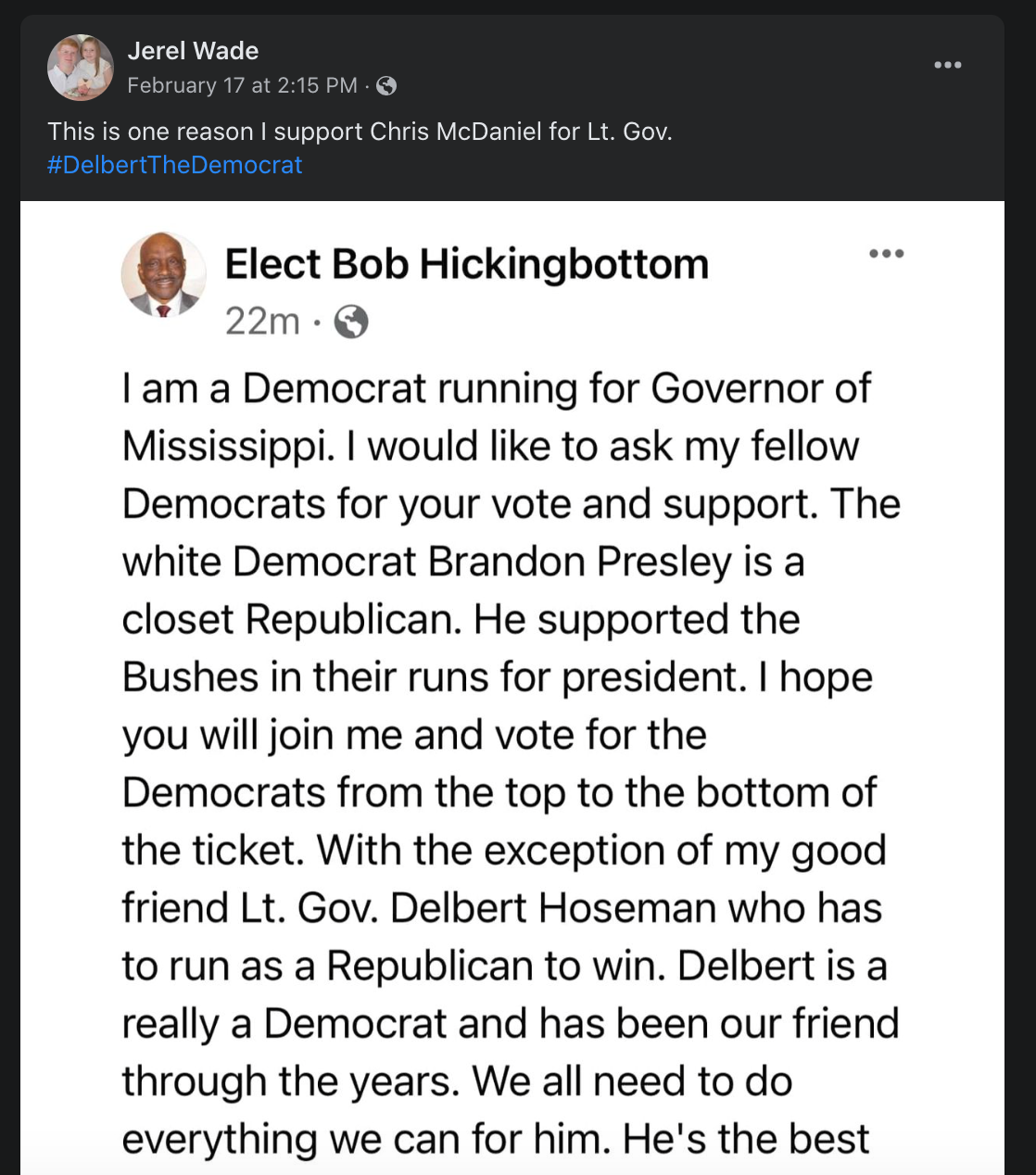
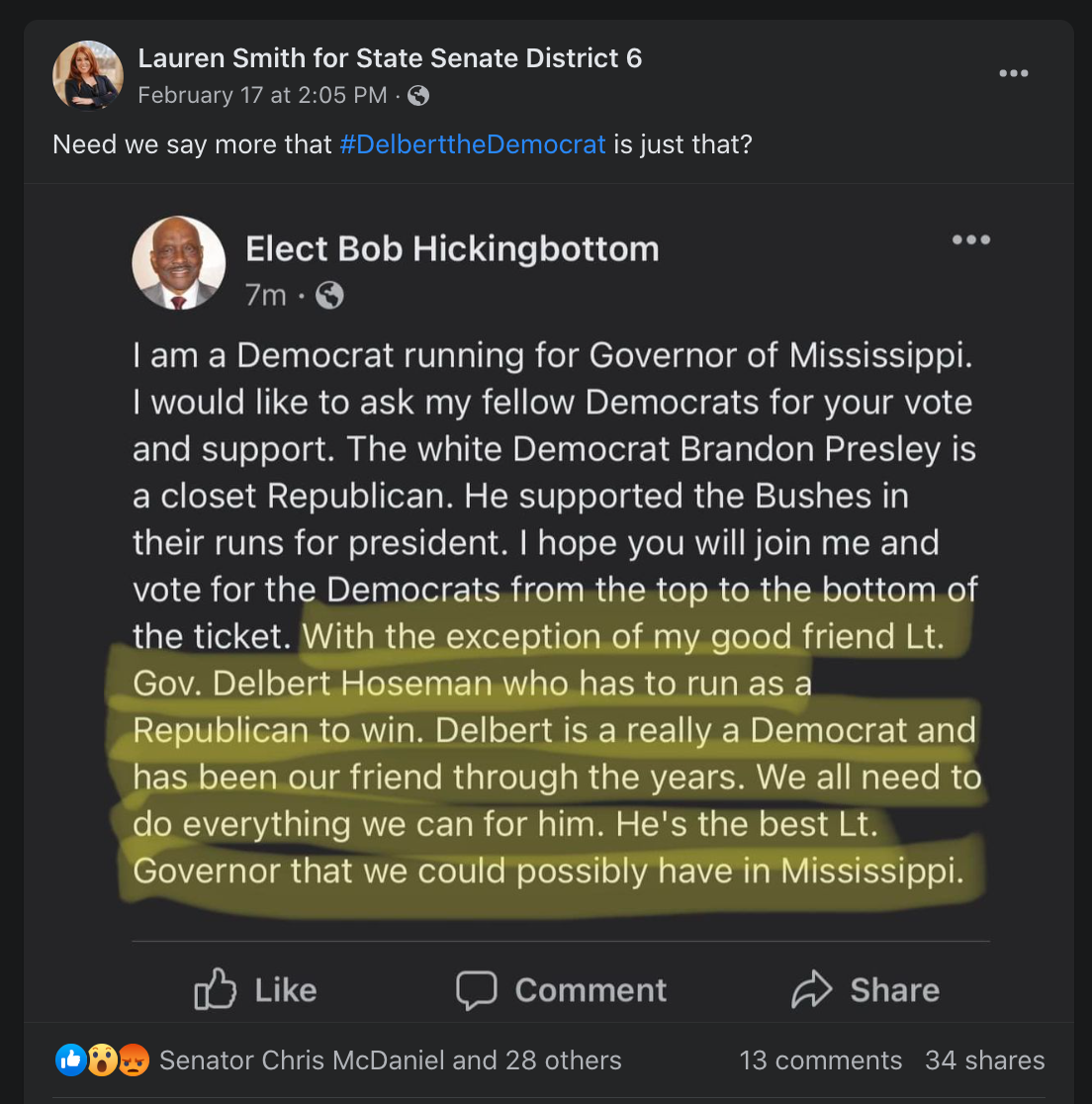
That evening, though, several Facebook users posted a different version of the Hickingbottom screenshot that spread quickly through Mississippi’s far-right conservative online spaces. This separate version of the Hickingbottom screenshot clearly showed something peculiar under the post: “Posted by Ashley Rae Bright.”
Social media savants know that those words being listed there indicates that a woman named Ashley Rae Bright is the “Elect Bob Hickingbottom” Facebook page administrator. In political campaigns, Facebook administrator duties are typically reserved for staffers of a campaign. It’s a delicate and important power to wield, and campaigns, in particular, are very careful about who gets granted that access.
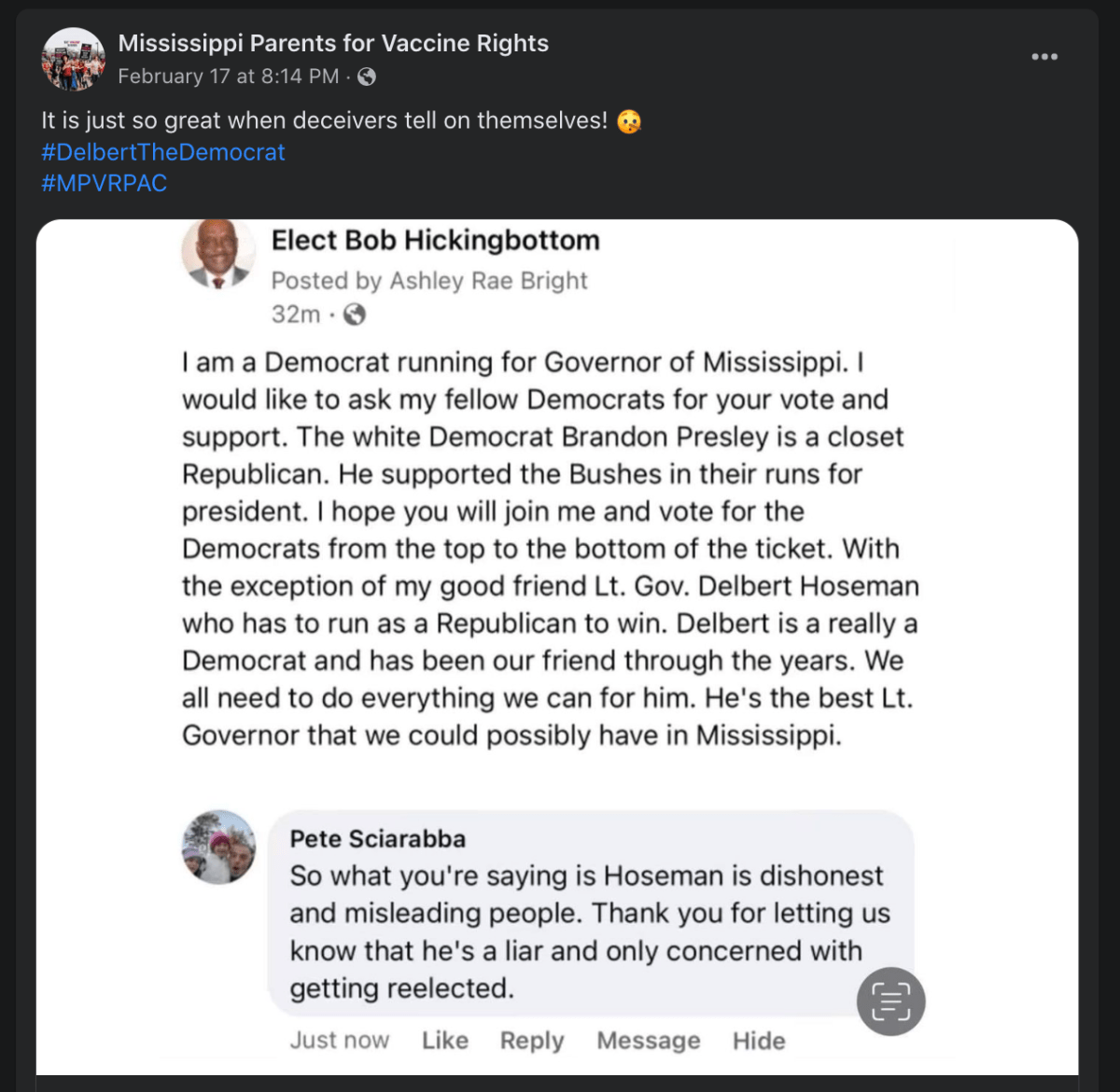

A quick Google search of Ashley Rae Bright shows that she is a consultant for The Allain Group, a Jackson-based political consulting company “offering strong strategic and creative expertise to political campaigns and business clients.”
The president of The Allain Group is Lane “L.C.” Murray, a longtime Mississippi political operative. Murray, a self-admitted former member of the Ku Klux Klan, became a controversial player in the 2014 Senate race between McDaniel and Cochran.
Murray told Breitbart News during the 2014 race that he was a McDaniel supporter after Murray threatened a Republican state senator by phone. His former membership to the KKK was a focus of the Breitbart piece.
Mississippi Today contacted Murray last week to ask if The Allain Group was working for Hickingbottom’s campaign in any way.
“The Allain Group hasn’t been hired by him,” Murray told Mississippi Today in a phone interview. “I do know Mr. Hickingbottom, he’s a better friend than anything else. I haven’t talked to him in a while. I know he’s had COVID and he recently got kicked off the Democratic ballot. But no, Hickingbottom has not contacted The Allain Group, and we are not doing anything for him.”
Asked why Bright, an employee of The Allain Group, appeared to be an administrator of the Elect Bob Hickingbottom Facebook page, Murray deflected.
“I don’t know anything about that,” Murray said. “She works some part time for us, uh, back and forth. I remember her saying something about her computer being hacked or something like that. She was raising hell one day about her Facebook had been hacked. But I’m going to talk to her in the next hour or so, and I’ll call you back and tell you what I find out.”
Murray hung up and called back later that day with an update.
“She does not know Bob Hickingbottom,” Murray said of Bright. “She said somebody hacked her computer, something about someone posting something to his campaign page. She reported it. A day or two later somebody hacked it with something else. I don’t know too much about computers. But like I said, I do know him, but we’re not doing any work for him at all.”
Mississippi Today reached out to Bright directly on Facebook and asked if she was working for the Hickingbottom campaign.
“Sir, I do not know the gentleman,” Bright wrote in a message. “My Facebook was hacked a couple times several weeks ago.”
When Mississippi Today sent Bright a screenshot that showed her as the Elect Bob Hickingbottom Facebook page administrator, Bright replied: “I seen that post as well, changed password and all. I don’t know him so therefore I can’t help you.”
When Mississippi Today then asked why a hacker would make her an administrator of Hickingbottom campaign’s Facebook page to post a political message, she doubled down on her denial of any work with Hickingbottom.
“Sir, I told you I do not know the gentleman,” Bright replied. “I do not know how that showed up on my Facebook. I’ve answered your questions. Now please leave me alone!”
Bright and Hickingbottom are friends on Facebook. Mississippi Today did not get the chance to ask Bright about why she is Facebook friends with someone she purportedly does not know before she declined to speak further.
Hickingbottom, 75, has been involved in Mississippi politics for decades. He broke through working as a political operative for scandal-ridden former Jackson Mayor Frank Melton. Speaking on popular conservative radio host Kim Wade’s show in 2007, Hickingbottom put his career this way: “I’ve been at the forefront of every dirty deal that was cut in politics.”
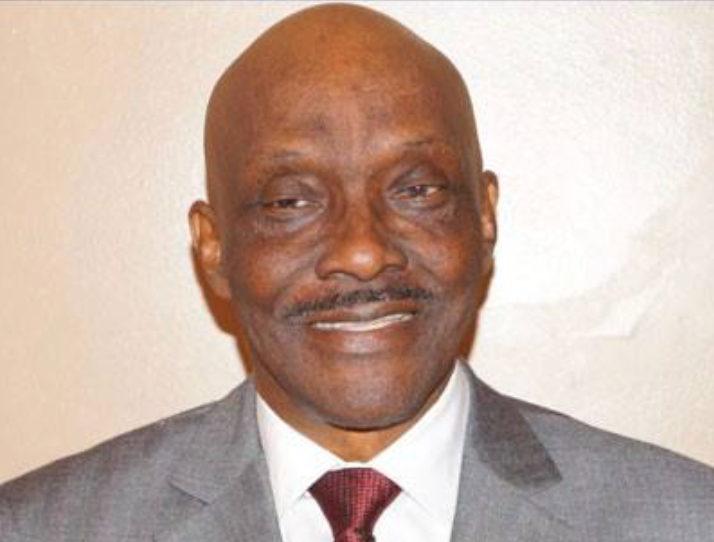
In 2019, Hickingbottom ran for governor as a Constitution Party candidate, using his limited platform to blister Democratic nominee Jim Hood, who came within six points of defeating now-Gov. Tate Reeves. In public Facebook posts during that race, Hickingbottom rarely turned his ire toward Reeves.
And most recently, Hickingbottom has been the subject of broad statewide news coverage after he and another candidate for governor were disqualified from the 2023 Democratic ballot. State Democratic Party officials say he was disqualified for not filing a statement of economic interest, a required form where candidates publicly disclose their personal business interests, and required campaign finance reports when he ran for governor in 2019. Since his disqualification, Hickingbottom has publicly panned Democratic Party leadership and has even threatened a lawsuit.
In a Mississippi Today interview with Hickingbottom last week, he said he thought it was “unconscionable” that the Democratic Party would disqualify two Black men in a primary against Public Service Commissioner Brandon Presley, who is white and widely regarded as the party’s frontrunner.
But later in the interview, talking about his political background, Hickingbottom said: “I’m pretty conservative myself, to tell you the truth. I’m honestly too conservative for the Democrats probably.”
“I’ll put it to you this way, I’m a political operative,” Hickingbottom said. “I’ll work with whoever hires me, Democrat or Republican or whoever.”
Mississippi Today asked Hickingbottom in the interview about the controversial Facebook post about Hosemann and the apparent ties to The Allain Group.
Hickingbottom told Mississippi Today that he published the Facebook post himself. Asked why Bright was listed as his Facebook page administrator who posted it, he got weird.
“I don’t, well, I don’t know an Ashley Bright. I don’t know who she is” Hickingbottom said before abruptly changing the subject.
When Mississippi Today circled back about why Bright showed up as the administrator of his campaign Facebook page, Hickingbottom paused.
“I’ll be honest with you, I’m an old guy and I didn’t even know anything about computers,” he said. “… I know how to do email and put stuff on Facebook, and I learned that basically through my telephone. All I can tell you is I don’t know her, I’ve never met her. Maybe she got hacked. All I use Facebook on is my phone. My phone has been hacked many times. I’ve had a reputation — let’s just put it like this, I was a flamethrower … I have a lot of enemies.”
He said several times during the interview that he believes Hosemann, a successful politician who has won four statewide elections as a Republican, is a Democrat. Hickingbottom said that he did not intend to hurt Hosemann nor help McDaniel.
“In 2014, I was on the air with other people talking against Chris McDaniel,” Hickingbottom said. “He was Tea Party, trying to do Thad (Cochran) in. We were talking about him real bad. A lot of people asked us to rip Chris McDaniel and get people to vote for Thad Cochran.”
Asked if he’d in any way solicited the help of The Allain Group to work on his campaign, Hickingbottom said he hadn’t. But he did acknowledge he knew Murray, the president of the consulting firm.
“I’ve known Lane Murray, he’s a fixture in politics,” Hickingbottom said. “I’ve been an operative myself for years and years. I know Lane Murray, Greg Brand, and to some extent they know me. But I haven’t seen him in two or three years at least. Since probably the end of 2020. I know him, but that’s the extent of it.”
Greg Brand, whom Hickingbottom mentioned unprompted, is another Mississippi political operative with a troubled past.
In 2016, then-Secretary of State Hosemann pushed then-Attorney General Jim Hood to pursue charges against Brand for violating election law — specifically for mailing attack ads without identifying the group or individual who sent it. Brand and another operative were sentenced to six months probation and a $500 fine. Brand briefly tried to sue Hosemann in federal court over the episode, but that lawsuit was dismissed.
There’s yet another strange tie between Hickingbottom and The Allain Group: they are immediate neighbors in the same Jackson office building, according to Mississippi Secretary of State records.
Hickingbottom, who owns a company called “Blackstone Distributors LLC,” lists his business address at 1755 Lelia Drive, Suite 232, Jackson, MS 39216. The office for The Allain Group is 1755 Lelia Drive, Suite 222, Jackson, MS 39216. The suites are directly next to one another on the second floor of the office building.
Hickingbottom told Mississippi Today he had a small office space at that address “a couple years ago, but I was wasting money by paying for it so I moved out.”
Murray repeated something similar.
“I’ve been in that office for four or five years,” Murray said of the office. “He had an office close to mine, a little one room thing. I might have seen him once or twice, but I don’t think he’s been in there for two or three years.”
Both Murray and Hickingbottom denied any coordinated effort to help McDaniel’s campaign.
Meanwhile, Hickingbottom continues posting incendiary Facebook posts about Hosemann. And McDaniel and his far-right social media circles keep using Hickingbottom’s posts to campaign directly against Hosemann. The strategy appears thorough and coordinated, and it has continued for weeks.
Radio host Kim Wade, a longtime and active public supporter of McDaniel, again had Hickingbottom on his show on Feb. 21 — just four days after Hickingbottom’s controversial Facebook post.
When Hickingbottom reiterated on the show that Hosemann was a Democrat, Wade replied: “Wow. There is some validity to what you’re saying given how he treated President Trump and how he treats conservatives. We can ignore it at our own peril.”
A clip of that radio show made its rounds on McDaniel’s social media.
“A MUST LISTEN,” McDaniel’s 2014 campaign manager and current state Sen. Melanie Sojourner posted to her Facebook page with a clip to the Wade interview.
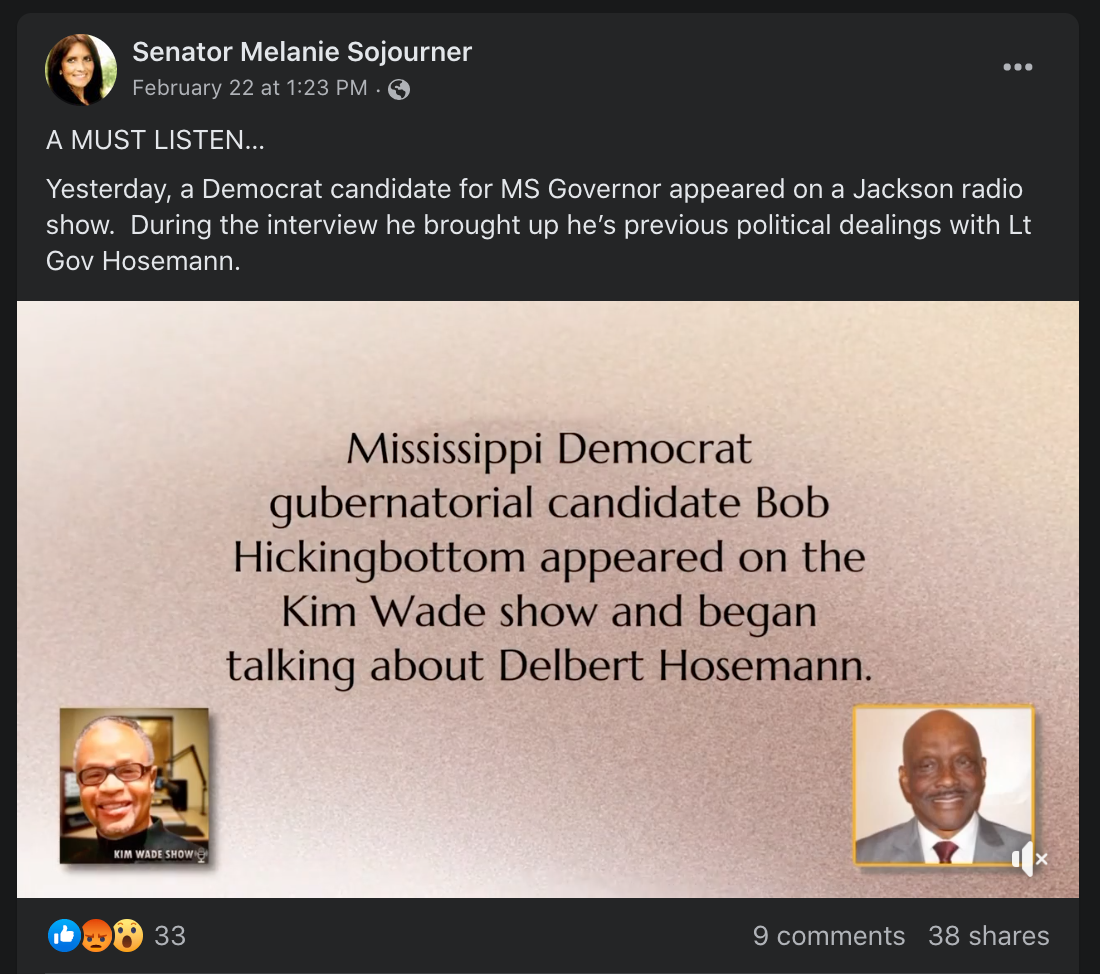
McDaniel posted the same radio clip to his own Facebook page with similar language to Sojourner’s post: “BREAKING: This is a MUST LISTEN. Democrat candidate for Governor discusses Delbert Hosemann: ‘He’s a Democrat.’”
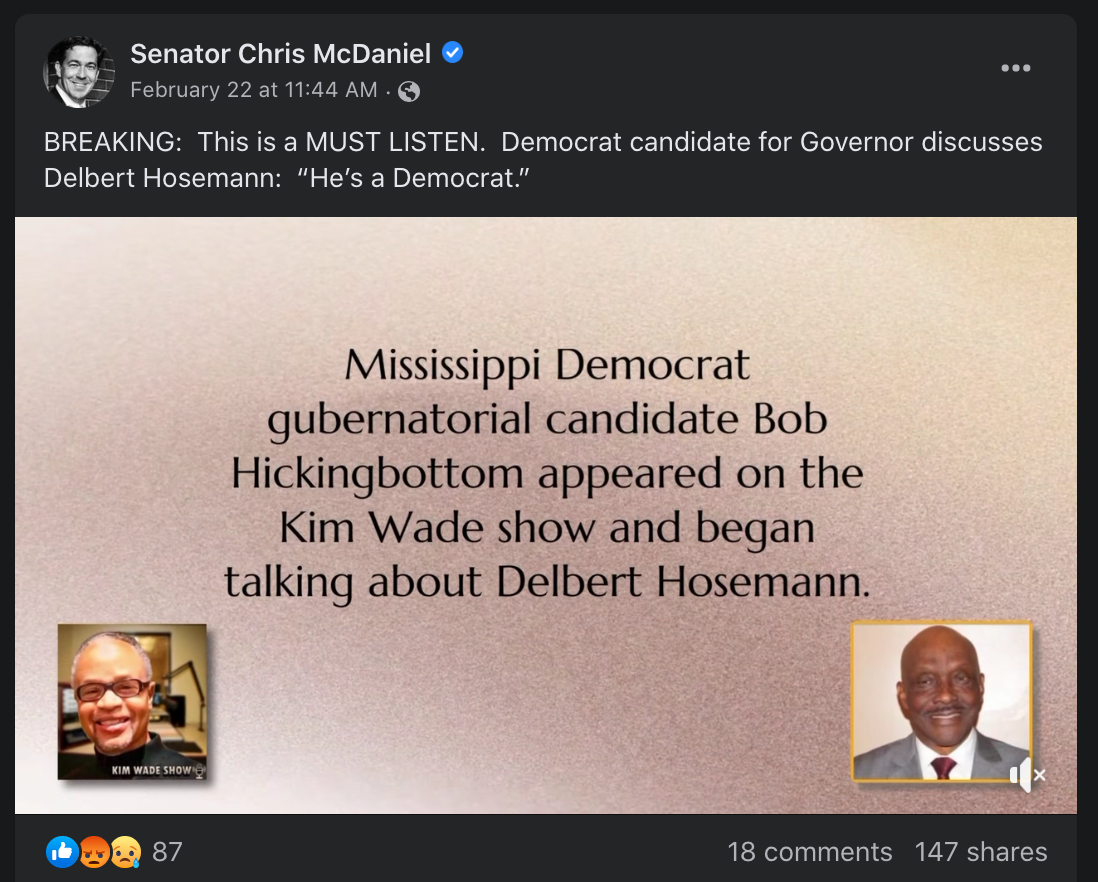
Others in right-wing media have been singing the same tune. Jim Cegielski, publisher of the Laurel Leader-Call newspaper and a longtime McDaniel lackey, wrote a column about Hickingbottom’s shock claim with the headline: “Delbert’s a Democrat … Bet your Hickingbottom dollar on it.”
McDaniel posted that column to his hundreds of thousands of social media followers multiple times. In all, McDaniel has posted at least 10 separate posts to his social media pages boosting Hickingbottom’s words and using them to paint Hosemann as a Democrat.
“BREAKING NEWS: Delbert Hosemann gets a huge endorsement this week,” McDaniel posted on Feb. 23. “You are not going to believe it! We’ve always known Democrats love Delbert Hosemann behind the scenes, but now they are becoming public in their support. A Democrat candidate for Governor, Bob Hickingbottom, publicly endorsed Delbert Hosemann this week!”
That long post from McDaniel went on to mention the Kim Wade radio interview, closing the post by writing: “Perhaps Bob Hickingbottom did say it best — Delbert is the best Lt. Governor that Democrats could possibly have in Mississippi. It’s time for a change, Mississippi.”
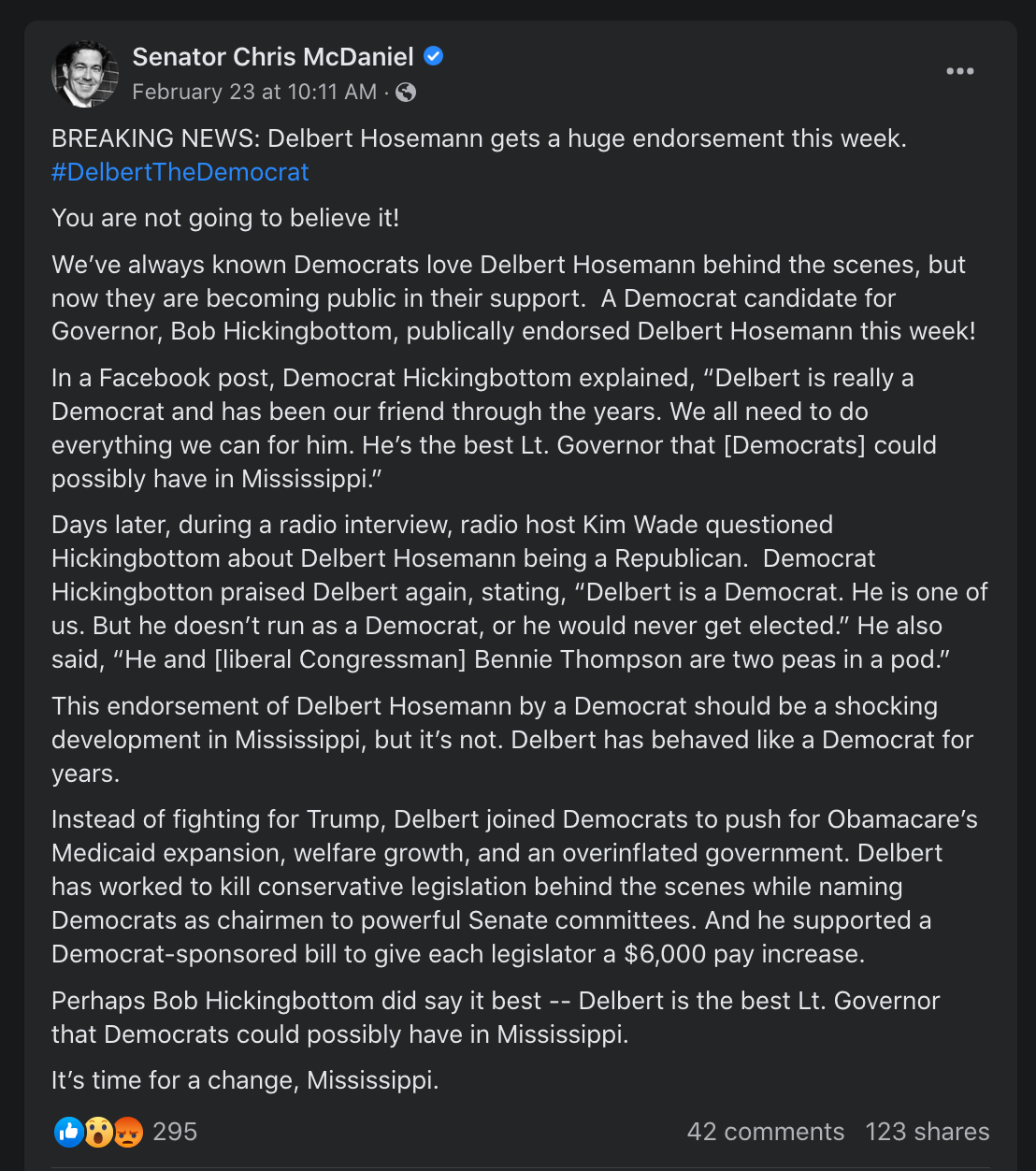
Hickingbottom, for his part, keeps on posting, even after Mississippi Today questioned him about his posts.
On March 7, Hickingbottom posted a letter he says he sent to Hosemann.
“To my fellow Mississippian and friend Lt. Governor Delbert Hosemann,” Hickingbottom’s letter begins, “I have been told that I may have hurt you and your re-election campaign for Lt. Governor. I sincerely hope that is not true because that was not my intention. If you recall, I first met you many years ago when I was introduced to you by our mutual friend Louis Armstrong. In those days we were all proud Democrats like most of Mississippi at the time.”
On March 9, Hickingbottom posted a rambling, all-caps post that reiterates he never meant to hurt “Lt. Gov. Delbert Horseman (sic).”
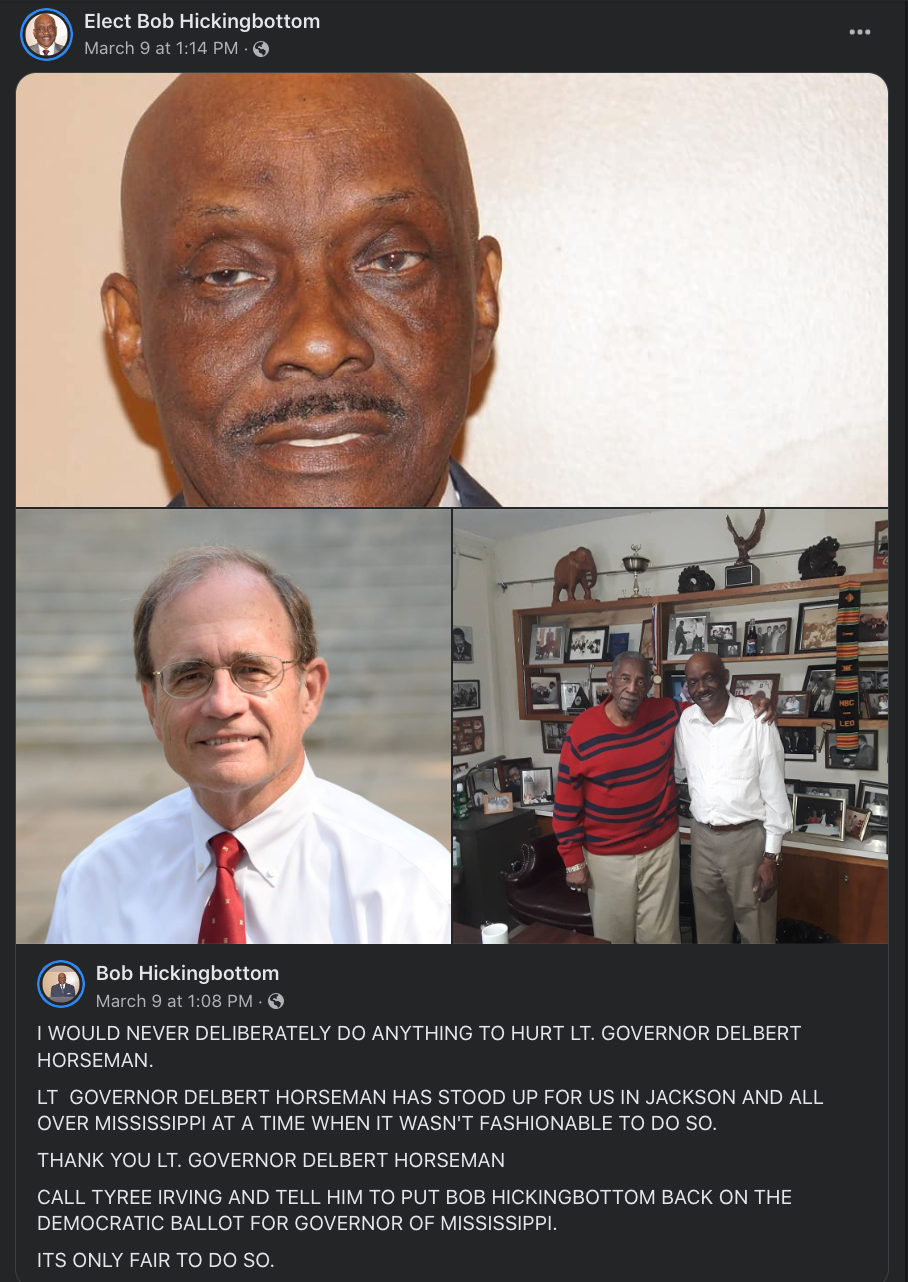
On March 12, Hickingbottom posted a criticism of Hosemann for his work to change the Mississippi state flag in 2020, retiring the state’s last-in-American Confederate battle emblem design to a museum. That is a pirated talking point from many of McDaniel’s supporters.
Asked for comment, the Hosemann campaign appeared to be following the sequence of Hickingbottom events closely.
“This scheme was concocted to create a false narrative to support a losing campaign,” said Casey Phillips, senior adviser for the Delbert Hosemann campaign. “Why else would a former Klansman and known McDaniel supporter be running this person’s Facebook page? Before we know it, they will all be locked up in a courthouse again.”
Phillips said Hosemann does not Hickingbottom, and that Hosemann has never received any letter from Hickingbottom — including that strange March 7 letter posted to Facebook.
The courthouse reference, of course, harkens back to the 2014 U.S. Senate race, when a McDaniel campaign staffer and two McDaniel supporters were found locked in the Hinds County Courthouse late on election night — one of just many shocking wrinkles of that wild race.
McDaniel’s campaign denied working with or communicating with Hickingbottom’s campaign and said that Murray is not working for the campaign.
“Unequivocally, neither Senator McDaniel nor any member of his campaign apparatus are communicating with, coordinating alongside, nor focusing on Bob Hickingbottom’s candidacy,” said Nicole Tardif, spokesperson for McDaniel’s campaign.
Murray, who told Mississippi Today last week he was not working with McDaniel, apparently fashions himself as working behind the scenes for the conservative state senator.
With the past week, Murray sent text messages to several people across the state. One person, granted anonymity over fear of retribution from the Ku Klux Klan, shared the Murray text with Mississippi Today. The message’s focus: “Delbert the Democrat.”
This article first appeared on Mississippi Today and is republished here under a Creative Commons license.
Mississippi Today
Mississippi prepares for another execution
The Mississippi Supreme Court has set the execution of a man who kidnapped and murdered a 20-year-old community college student in north Mississippi 30 years ago.
Charles Ray Crawford, 59, is set to be executed Oct. 15 at the Mississippi State Penitentiary at Parchman, after multiple requests by the attorney general’s office.
Eight justices joined the majority opinion to set the execution, concluding that Crawford has exhausted all state and federal legal remedies. Mississippi Supreme Court Justice T. Kenneth Griffis Jr. wrote the Friday opinion. Justice David Sullivan did not participate.
However, Kristy Noble with the Mississippi Office of Capital Post-Conviction Counsel released a statement saying it will file another appeal with the U.S. Supreme Court.
“”Mr. Crawford’s inexperienced trial counsel conceded his guilt to the jury — against Mr.
Crawford’s timely and repeated objections,” Noble said in the statement. “Mr. Crawford told his counsel to pursue a not guilty verdict. Counsel did just the opposite, which is precisely what the U.S. Supreme Court says counsel cannot do,” Noble said in the statement.
“A trial like Mr. Crawford’s – one where counsel concedes guilt over his client’s express wishes – is essentially no trial at all.”
Last fall, Crawford’s attorneys asked the court not to set an execution date because he hadn’t exhausted appeal efforts in federal court to challenge a rape conviction that is not tied to his death sentence. In June, the U.S. Supreme Court declined to take up Crawford’s case.
A similar delay occurred a decade ago, when the AG’s office asked the court to reset Crawford’s execution date, but that was denied because efforts to appeal his unrelated rape conviction were still pending.
After each unsuccessful filing, the attorney general’s office asked the Mississippi Supreme Court to set Crawford’s execution date.
On Friday, the court also denied Crawford’s third petition for post-conviction relief and a request for oral argument. It accepted the state’s motion to dismiss the petition. Seven justices concurred and Justice Leslie King concurred in result only. Again, Justice Sullivan did not participate.
Crawford was convicted and sentenced to death in Lafayette County for the 1993 rape and murder of North Mississippi Community College student Kristy Ray.
Days before he was set to go to trial on separate aggravated assault and rape charges, he kidnapped Ray from her parents’ Tippah County home, leaving ransom notes. Crawford took Ray to an abandoned barn where he stabbed her, and his DNA was found on her, indicating he sexually assaulted her, according to court records.
Crawford told police he had blackouts and only remembered parts of the crime, but not killing Ray. Later he admitted “he must of killed her” and led police to Ray’s body, according to court records.
At his 1994 trial he presented an insanity defense, including that he suffered from psychogenic amnesia – periods of time lapse without memory. Medical experts who provided rebuttal testimony said Crawford didn’t have psychogenic amnesia and didn’t show evidence of bipolar illness.
The last person executed in Mississippi was Richard Jordan in June, previously the state’s oldest and longest serving person on death row.
There are 36 people on death row, according to records from the Mississippi Department of Corrections.
Update 9/15/25: This story has been updated to include a response from the Mississippi Office of Capital Post-Conviction Counsel
This article first appeared on Mississippi Today and is republished here under a Creative Commons Attribution-NoDerivatives 4.0 International License.
The post Mississippi prepares for another execution appeared first on mississippitoday.org
Note: The following A.I. based commentary is not part of the original article, reproduced above, but is offered in the hopes that it will promote greater media literacy and critical thinking, by making any potential bias more visible to the reader –Staff Editor.
Political Bias Rating: Centrist
The article presents a factual and balanced account of the legal proceedings surrounding a scheduled execution in Mississippi. It includes perspectives from both the state’s attorney general’s office and the defense counsel, without using emotionally charged language or advocating for a particular political stance. The focus on legal details and court decisions reflects a neutral, informative approach typical of centrist reporting.
Mississippi Today
Presidents are taking longer to declare major natural disasters. For some, the wait is agonizing
TYLERTOWN — As an ominous storm approached Buddy Anthony’s one-story brick home, he took shelter in his new Ford F-250 pickup parked under a nearby carport.
Seconds later, a tornado tore apart Anthony’s home and damaged the truck while lifting it partly in the air. Anthony emerged unhurt. But he had to replace his vehicle with a used truck that became his home while waiting for President Donald Trump to issue a major disaster declaration so that federal money would be freed for individuals reeling from loss. That took weeks.
“You wake up in the truck and look out the windshield and see nothing. That’s hard. That’s hard to swallow,” Anthony said.
Disaster survivors are having to wait longer to get aid from the federal government, according to a new Associated Press analysis of decades of data. On average, it took less than two weeks for a governor’s request for a presidential disaster declaration to be granted in the 1990s and early 2000s. That rose to about three weeks during the past decade under presidents from both major parties. It’s taking more than a month, on average, during Trump’s current term, the AP found.
The delays mean individuals must wait to receive federal aid for daily living expenses, temporary lodging and home repairs. Delays in disaster declarations also can hamper recovery efforts by local officials uncertain whether they will receive federal reimbursement for cleaning up debris and rebuilding infrastructure. The AP collaborated with Mississippi Today and Mississippi Free Press on the effects of these delays for this report.
“The message that I get in the delay, particularly for the individual assistance, is that the federal government has turned its back on its own people,” said Bob Griffin, dean of the College of Emergency Preparedness, Homeland Security and Cybersecurity at the University at Albany in New York. “It’s a fundamental shift in the position of this country.”
The wait for disaster aid has grown as Trump remakes government
The Federal Emergency Management Agency often consults immediately with communities to coordinate their initial disaster response. But direct payments to individuals, nonprofits and local governments must wait for a major disaster declaration from the president, who first must receive a request from a state, territory or tribe. Major disaster declarations are intended only for the most damaging events that are beyond the resources of states and local governments.
Trump has approved more than two dozen major disaster declarations since taking office in January, with an average wait of almost 34 days after a request. That ranged from a one-day turnaround after July’s deadly flash flooding in Texas to a 67-day wait after a request for aid because of a Michigan ice storm. The average wait is up from a 24-day delay during his first term and is nearly four times as long as the average for former Republican President George H.W. Bush, whose term from 1989-1993 coincided with the implementation of a new federal law setting parameters for disaster determinations.
The delays have grown over time, regardless of the party in power. Former Democratic President Joe Biden, in his last year in office, averaged 26 days to declare major disasters — longer than any year under former Democratic President Barack Obama.

FEMA did not respond to the AP’s questions about what factors are contributing to the trend.
Others familiar with FEMA noted that its process for assessing and documenting natural disasters has become more complex over time. Disasters have also become more frequent and intense because of climate change, which is mostly caused by the burning of fuels such as gas, coal and oil.
The wait for disaster declarations has spiked as Trump’s administration undertakes an ambitious makeover of the federal government that has shed thousands of workers and reexamined the role of FEMA. A recently published letter from current and former FEMA employees warned the cuts could become debilitating if faced with a large-enough disaster. The letter also lamented that the Trump administration has stopped maintaining or removed long-term planning tools focused on extreme weather and disasters.
Shortly after taking office, Trump floated the idea of “getting rid” of FEMA, asserting: “It’s very bureaucratic, and it’s very slow.”
FEMA’s acting chief suggested more recently that states should shoulder more responsibility for disaster recovery, though FEMA thus far has continued to cover three-fourths of the costs of public assistance to local governments, as required under federal law. FEMA pays the full cost of its individual assistance.
Former FEMA Administrator Pete Gaynor, who served during Trump’s first term, said the delay in issuing major disaster declarations likely is related to a renewed focus on making sure the federal government isn’t paying for things state and local governments could handle.
“I think they’re probably giving those requests more scrutiny,” Gaynor said. “And I think it’s probably the right thing to do, because I think the (disaster) declaration process has become the ‘easy button’ for states.”
The Associated Press on Monday received a statement from White House spokeswoman Abigail Jackson in response to a question about why it is taking longer to issue major natural disaster declarations:
“President Trump provides a more thorough review of disaster declaration requests than any Administration has before him. Gone are the days of rubber stamping FEMA recommendations – that’s not a bug, that’s a feature. Under prior Administrations, FEMA’s outsized role created a bloated bureaucracy that disincentivized state investment in their own resilience. President Trump is committed to right-sizing the Federal government while empowering state and local governments by enabling them to better understand, plan for, and ultimately address the needs of their citizens. The Trump Administration has expeditiously provided assistance to disasters while ensuring taxpayer dollars are spent wisely to supplement state actions, not replace them.”

In Mississippi, frustration festered during wait for aid
The tornado that struck Anthony’s home in rural Tylertown on March 15 packed winds up to 140 mph. It was part of a powerful system that wrecked homes, businesses and lives across multiple states.
Mississippi’s governor requested a federal disaster declaration on April 1. Trump granted that request 50 days later, on May 21, while approving aid for both individuals and public entities.
On that same day, Trump also approved eight other major disaster declarations for storms, floods or fires in seven other states. In most cases, more than a month had passed since the request and about two months since the date of those disasters.
If a presidential declaration and federal money had come sooner, Anthony said he wouldn’t have needed to spend weeks sleeping in a truck before he could afford to rent the trailer where he is now living. His house was uninsured, Anthony said, and FEMA eventually gave him $30,000.
In nearby Jayess in Lawrence County, Dana Grimes had insurance but not enough to cover the full value of her damaged home. After the eventual federal declaration, Grimes said FEMA provided about $750 for emergency expenses, but she is now waiting for the agency to determine whether she can receive more.

“We couldn’t figure out why the president took so long to help people in this country,” Grimes said. “I just want to tie up strings and move on. But FEMA — I’m still fooling with FEMA.”
Jonathan Young said he gave up on applying for FEMA aid after the Tylertown tornado killed his 7-year-old son and destroyed their home. The process seemed too difficult, and federal officials wanted paperwork he didn’t have, Young said. He made ends meet by working for those cleaning up from the storm.
“It’s a therapy for me,” Young said, “to pick up the debris that took my son away from me.”
Historically, presidential disaster declarations containing individual assistance have been approved more quickly than those providing assistance only to public entities, according to the AP’s analysis. That remains the case under Trump, though declarations for both types are taking longer.
About half the major disaster declarations approved by Trump this year have included individual assistance.
Some people whose homes are damaged turn to shelters hosted by churches or local nonprofit organizations in the initial chaotic days after a disaster. Others stay with friends or family or go to a hotel, if they can afford it.
But some insist on staying in damaged homes, even if they are unsafe, said Chris Smith, who administered FEMA’s individual assistance division under three presidents from 2015-2022. If homes aren’t repaired properly, mold can grow, compounding the recovery challenges.

That’s why it’s critical for FEMA’s individual assistance to get approved quickly — ideally, within two weeks of a disaster, said Smith, who’s now a disaster consultant for governments and companies.
“You want to keep the people where they are living. You want to ensure those communities are going to continue to be viable and recover,” Smith said. “And the earlier that individual assistance can be delivered … the earlier recovery can start.”
In the periods waiting for declarations, the pressure falls on local officials and volunteers to care for victims and distribute supplies.
In Walthall County, where Tylertown is, insurance agent Les Lampton remembered watching the weather news as the first tornado missed his house by just an eighth of a mile. Lampton, who moonlights as a volunteer firefighter, navigated the collapsed trees in his yard and jumped into action. About 45 minutes later, the second tornado hit just a mile away.
“It was just chaos from there on out,” Lampton said.
Walthall County, with a population of about 14,000, hasn’t had a working tornado siren in about 30 years, Lampton said. He added there isn’t a public safe room in the area, although a lot of residents have ones in their home.
Rural areas with limited resources are hit hard by delays in receiving funds through FEMA’s public assistance program, which, unlike individual assistance, only reimburses local entities after their bills are paid. Long waits can stoke uncertainty and lead cost-conscious local officials to pause or scale-back their recovery efforts.

In Walthall County, officials initially spent about $700,000 cleaning up debris, then suspended the cleanup for more than a month because they couldn’t afford to spend more without assurance they would receive federal reimbursement, said county emergency manager Royce McKee. Meanwhile, rubble from splintered trees and shattered homes remained piled along the roadside, creating unsafe obstacles for motorists and habitat for snakes and rodents.
When it received the federal declaration, Walthall County took out a multimillion-dollar loan to pay contractors to resume the cleanup.
“We’re going to pay interest and pay that money back until FEMA pays us,” said Byran Martin, an elected county supervisor. “We’re hopeful that we’ll get some money by the first of the year, but people are telling us that it could be [longer].”
Lampton, who took after his father when he joined the volunteer firefighters 40 years ago, lauded the support of outside groups such as Cajun Navy, Eight Days of Hope, Samaritan’s Purse and others. That’s not to mention the neighbors who brought their own skid steers and power saws to help clear trees and other debris, he added.
“That’s the only thing that got us through this storm, neighbors helping neighbors,” Lampton said. “If we waited on the government, we were going to be in bad shape.”
Lieb reported from Jefferson City, Missouri, and Wildeman from Hartford, Connecticut.
Update 98/25: This story has been updated to include a White House statement released after publication.
This article first appeared on Mississippi Today and is republished here under a Creative Commons Attribution-NoDerivatives 4.0 International License.
The post Presidents are taking longer to declare major natural disasters. For some, the wait is agonizing appeared first on mississippitoday.org
Note: The following A.I. based commentary is not part of the original article, reproduced above, but is offered in the hopes that it will promote greater media literacy and critical thinking, by making any potential bias more visible to the reader –Staff Editor.
Political Bias Rating: Center-Left
This article presents a critical view of the Trump administration’s handling of disaster declarations, highlighting delays and their negative impacts on affected individuals and communities. It emphasizes concerns about government downsizing and reduced federal support, themes often associated with center-left perspectives that favor robust government intervention and social safety nets. However, it also includes statements from Trump administration officials defending their approach, providing some balance. Overall, the tone and framing lean slightly left of center without being overtly partisan.
Mississippi Today
Northeast Mississippi speaker and worm farmer played key role in Coast recovery after Hurricane Katrina
The 20th anniversary of Hurricane Katrina slamming the Mississippi Gulf Coast has come and gone, rightfully garnering considerable media attention.
But still undercovered in the 20th anniversary saga of the storm that made landfall on Aug. 29, 2005, and caused unprecedented destruction is the role that a worm farmer from northeast Mississippi played in helping to revitalize the Coast.
House Speaker Billy McCoy, who died in 2019, was a worm farmer from the Prentiss, not Alcorn County, side of Rienzi — about as far away from the Gulf Coast as one could be in Mississippi.
McCoy grew other crops, but a staple of his operations was worm farming.
Early after the storm, the House speaker made a point of touring the Coast and visiting as many of the House members who lived on the Coast as he could to check on them.
But it was his action in the forum he loved the most — the Mississippi House — that is credited with being key to the Coast’s recovery.
Gov. Haley Barbour had called a special session about a month after the storm to take up multiple issues related to Katrina and the Gulf Coast’s survival and revitalization. The issue that received the most attention was Barbour’s proposal to remove the requirement that the casinos on the Coast be floating in the Mississippi Sound.
Katrina wreaked havoc on the floating casinos, and many operators said they would not rebuild if their casinos had to be in the Gulf waters. That was a crucial issue since the casinos were a major economic engine on the Coast, employing an estimated 30,000 in direct and indirect jobs.
It is difficult to fathom now the controversy surrounding Barbour’s proposal to allow the casinos to locate on land next to the water. Mississippi’s casino industry that was birthed with the early 1990s legislation was still new and controversial.
Various religious groups and others had continued to fight and oppose the casino industry and had made opposition to the expansion of gambling a priority.
Opposition to casinos and expansion of casinos was believed to be especially strong in rural areas, like those found in McCoy’s beloved northeast Mississippi. It was many of those rural areas that were the homes to rural white Democrats — now all but extinct in the Legislature but at the time still a force in the House.
So, voting in favor of casino expansion had the potential of being costly for what was McCoy’s base of power: the rural white Democrats.
Couple that with the fact that the Democratic-controlled House had been at odds with the Republican Barbour on multiple issues ranging from education funding to health care since Barbour was inaugurated in January 2004.
Barbour set records for the number of special sessions called by the governor. Those special sessions often were called to try to force the Democratic-controlled House to pass legislation it killed during the regular session.
The September 2005 special session was Barbour’s fifth of the year. For context, current Gov. Tate Reeves has called four in his nearly six years as governor.
There was little reason to expect McCoy to do Barbour’s bidding and lead the effort in the Legislature to pass his most controversial proposal: expanding casino gambling.
But when Barbour ally Lt. Gov. Amy Tuck, who presided over the Senate, refused to take up the controversial bill, Barbour was forced to turn to McCoy.
The former governor wrote about the circumstances in an essay he penned on the 20th anniversary of Hurricane Katrina for Mississippi Today Ideas.
“The Senate leadership, all Republicans, did not want to go first in passing the onshore casino law,” Barbour wrote. “So, I had to ask Speaker McCoy to allow it to come to the House floor and pass. He realized he should put the Coast and the state’s interests first. He did so, and the bill passed 61-53, with McCoy voting no.
“I will always admire Speaker McCoy, often my nemesis, for his integrity in putting the state first.”
Incidentally, former Rep. Bill Miles of Fulton, also in northeast Mississippi, was tasked by McCoy with counting, not whipping votes, to see if there was enough support in the House to pass the proposal. Not soon before the key vote, Miles said years later, he went to McCoy and told him there were more than enough votes to pass the legislation so he was voting no and broached the idea of the speaker also voting no.
It is likely that McCoy would have voted for the bill if his vote was needed.
Despite his no vote, the Biloxi Sun Herald newspaper ran a large photo of McCoy and hailed the Rienzi worm farmer as a hero for the Mississippi Gulf Coast.
This article first appeared on Mississippi Today and is republished here under a Creative Commons Attribution-NoDerivatives 4.0 International License.
The post Northeast Mississippi speaker and worm farmer played key role in Coast recovery after Hurricane Katrina appeared first on mississippitoday.org
Note: The following A.I. based commentary is not part of the original article, reproduced above, but is offered in the hopes that it will promote greater media literacy and critical thinking, by making any potential bias more visible to the reader –Staff Editor.
Political Bias Rating: Centrist
The article presents a factual and balanced account of the political dynamics surrounding Hurricane Katrina recovery efforts in Mississippi, focusing on bipartisan cooperation between Democratic and Republican leaders. It highlights the complexities of legislative decisions without overtly favoring one party or ideology, reflecting a neutral and informative tone typical of centrist reporting.
-
News from the South - North Carolina News Feed6 days ago
What we know about Charlie Kirk shooting suspect, how he was caught
-
Local News7 days ago
Russian drone incursion in Poland prompts NATO leaders to take stock of bigger threats
-
Local News Video7 days ago
Introducing our WXXV Student Athlete of the Week, St. Patrick’s Parker Talley!
-
News from the South - North Carolina News Feed6 days ago
Federal hate crime charge sought in Charlotte stabbing | North Carolina
-
The Center Square7 days ago
Weapon recovered as manhunt continues in Kirk assassination investigation | National
-
News from the South - Arkansas News Feed5 days ago
NW Arkansas Championship expected to bring money to Rogers
-
Our Mississippi Home5 days ago
Screech Owls – Small but Cute
-
News from the South - Tennessee News Feed7 days ago
Middle Tennessee State University dean filed over Kirk comments | Tennessee
